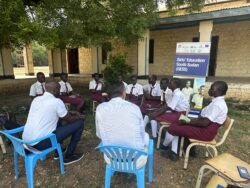One Million Girls and Counting!
August 15, 2023 4:33 pmMarking a major milestone for girls’ education in South Sudan.
As of today, the Governments of the United Kingdom, Canada, the European Union, United States, and Sweden have helped more than one million girls in South Sudan access education opportunities and stay in school, thanks to the joint investment in the second phase of the Girl’s Education South Sudan (GESS 2) programme, which is running from 2018 to 2024.
More than 2.8 million children in South Sudan are out of school, with poverty being the biggest barrier to education. Girls are often the first to miss out as boys are traditionally prioritised when families struggle to meet the costs of schooling. A lack of schools means many children must travel long distances or miss out entirely, while high levels of child marriage and early pregnancy mean girls drop out and may never return. The economic impacts of the climate crisis mean families cannot afford to send children to school, and flooding is destroying infrastructure. Even for those children who are enrolled, a lack of qualified teachers is severely impacting the quality of learning.
In the face of these challenges, the United Kingdom, Canada, European Union, United States, and Sweden have helped drive progress in South Sudan through GESS. Between 2019 and 2023, 1.05 million girls have received cash transfers to help them, and their families meet the costs of going to school, buy uniforms, books, sanitary items, and pay for transport. Over the past decade, two phases of the GESS programme have helped enable a dramatic increase in the number of girls enrolled in school – from just over 520,000 at primary and 9,900 in secondary in 2011, to nearly one million in primary and over 70,000 in secondary in 2022.
At a joint visit to Juba Girls’ Secondary School today, Heads of Cooperation from GESS donors met with beneficiaries to hear first-hand how GESS support is enabling them to enroll in and stay in school. Girls told of how, by completing their secondary education, they hope to go on to become nurses, lawyers, pilots, and doctors. It is critical to the future of South Sudan that they are supported to succeed.

GESS donors met with beneficiaries to hear first-hand how GESS support is enabling them to enroll in and stay in school
Education remains a priority for South Sudan’s donors. But donor support should be seen as a complement to, not a substitute for, the Revitalized Transitional Government of National Unity’s own investments in the education system. This means ensuring there are sufficient resources allocated and disbursed through the budget to pay teachers a fair wage on time and provide schools with the money they need to meet their running and repair costs. Only then will children in South Sudan be able to gain the free, safe, quality education that is promised in South Sudan’s constitution and which is vital to achieving their dreams.
Background:
- The Girls’ Education South Sudan Programme (GESS) is a multi-donor partnership between the governments of the UK, Canada, EU, United States, and Sweden. GESS is the only nationwide education programme in South Sudan. By March 2024 donors will have spent over $93 million under the GESS 2 programme (2018-2024).
- As well as providing cash transfers to girls in P5 – S4, GESS 2 has supported nearly 250 secondary schools with grants to meet their basic running costs, reached over 2.3 million people with community education and radio programmes on the importance of education, provided school-based mentoring to almost 23,000 children across 228 schools, supported nearly 600 teachers with the opportunity to complete their secondary education through accelerated learning programmes, trained over 400 education staff to enable better-run schools, and provided public financial management technical assistance to national and state education ministries to improve transparency and accountability within the education sector.
- The Ministry of General Education and Instruction (MoGEI) supports the GESS programme, which is managed by implementing partners who provide technical advice.
- The implementing partners for GESS include Cambridge Education/Mott MacDonald as the consortium lead, BBC Media Action, Montrose and Windle Trust International, together with seven State Anchor NGOs that implement the programme in the ten states and three administration areas of South Sudan.
Categorised in: Cash Transfers, Girls' Education, Human Interest Story
Comments are closed here.